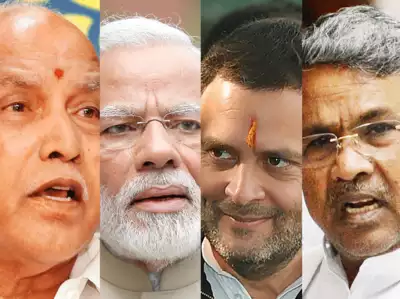The recent Lok Sabha (LS) election results have intensified the internal strife within the Karnataka Congress, bringing to light longstanding disagreements and discontent among party members. The scrutiny and analysis of the electoral outcomes have revealed significant rifts in opinions on leadership, strategy, and alliances, raising questions about the party’s future trajectory.
A Fractured Front
In the aftermath of the LS polls, several senior Congress leaders have voiced their dissatisfaction with the party’s performance, attributing the setbacks to various factors. The internal blame game has seen fingers pointed at state and central leadership, campaign strategies, and the handling of local alliances. This public airing of grievances has highlighted the fractures within the party, making it clear that a unified front is currently lacking.
Leadership Under Fire
Leadership decisions have come under intense scrutiny, with some party members criticizing the perceived lack of direction and ineffective campaign strategies. Key figures in the Karnataka Congress have called for introspection, arguing that the leadership failed to adequately mobilize grassroots support and connect with voters. This criticism has been directed at both state leaders and the central high command, suggesting a deep-seated dissatisfaction with the current leadership structure.
Strategic Missteps
The party’s campaign strategies have been another focal point of criticism. Many believe that the Congress’s messaging failed to resonate with voters, who were swayed by the narratives presented by rival parties. The absence of a clear and compelling vision for Karnataka’s future, combined with inconsistent campaign efforts, is seen as a major reason for the electoral setbacks. There is a growing consensus that a more cohesive and well-coordinated strategy is essential for future success.
Alliance Dilemmas
The handling of regional alliances has also been a contentious issue. Some Congress leaders advocate for forming strategic alliances with local parties to strengthen their electoral prospects. However, others argue that such alliances could dilute the Congress’s identity and alienate its core voter base. This debate has underscored the lack of a unified approach to navigating the complex political landscape of Karnataka.
The Path Forward
As the Karnataka Congress grapples with these internal challenges, the need for a clear path forward becomes increasingly urgent. Addressing the root causes of internal discord and presenting a unified front will be crucial for the party’s prospects. This involves not only resolving leadership disputes but also developing a cohesive strategy that reflects the aspirations and needs of the electorate.
Calls for Reform
Prominent voices within the party are calling for substantial reforms to rejuvenate the Congress in Karnataka. This includes reassessing leadership roles, enhancing grassroots engagement, and crafting a compelling vision for the state’s future. There is a growing recognition that to effectively counter the dominance of rival parties, the Congress must undergo significant changes and adapt to the evolving political dynamics.
Grassroots Mobilization
One of the key areas of focus is grassroots mobilization. Critics argue that the party’s disconnect with local issues and communities contributed to its poor performance. Strengthening ties with grassroots organizations, engaging with local leaders, and addressing the concerns of ordinary voters are seen as essential steps to rebuild the party’s support base.
Engaging the Youth
Engaging the youth demographic is another priority. With a significant portion of the electorate being young voters, the Congress must develop policies and initiatives that resonate with their aspirations. This involves not only addressing issues like employment and education but also leveraging digital platforms and social media to connect with younger voters.
Building a United Front
To overcome its current challenges, the Karnataka Congress must prioritize building a united front. This involves fostering internal dialogue, bridging gaps between different factions, and creating a sense of shared purpose. Only by presenting a cohesive and united front can the party hope to regain the trust and support of the electorate.
Conclusion
The Karnataka Congress is at a critical juncture as it faces the fallout from the LS poll results. The deepening rift within the party underscores the need for comprehensive reforms and a renewed focus on unity and strategic coherence. Addressing these internal issues and adapting to the changing political landscape will be crucial for the Congress to reclaim its position and effectively challenge its rivals in Karnataka.



